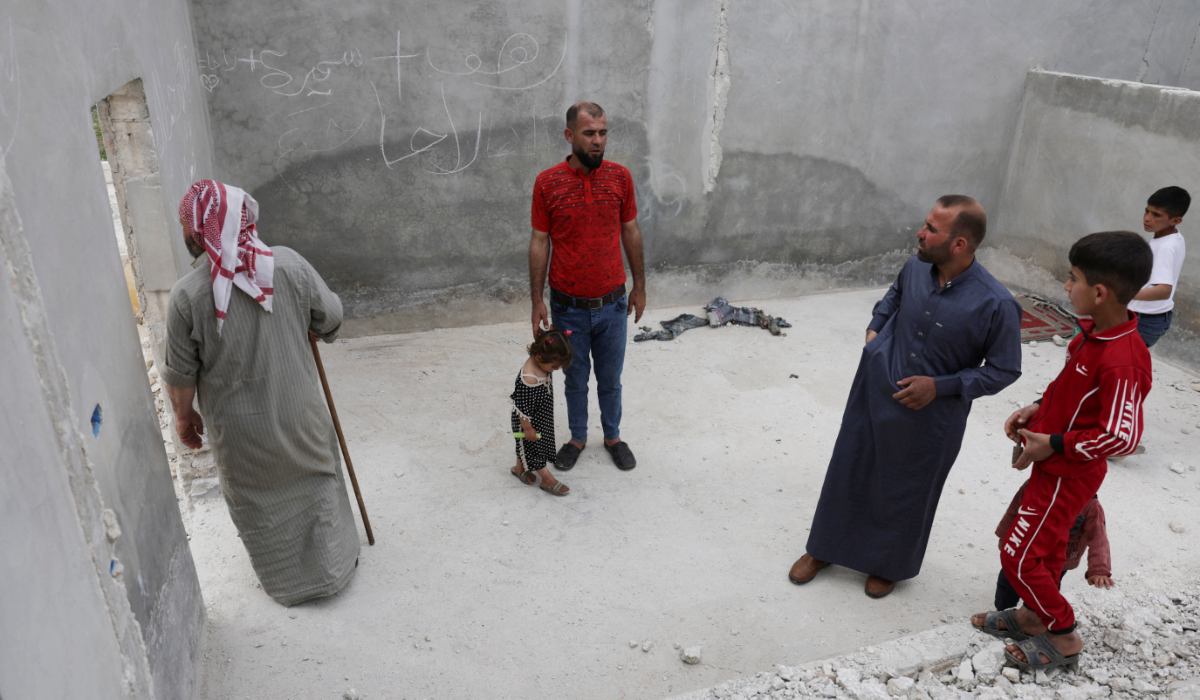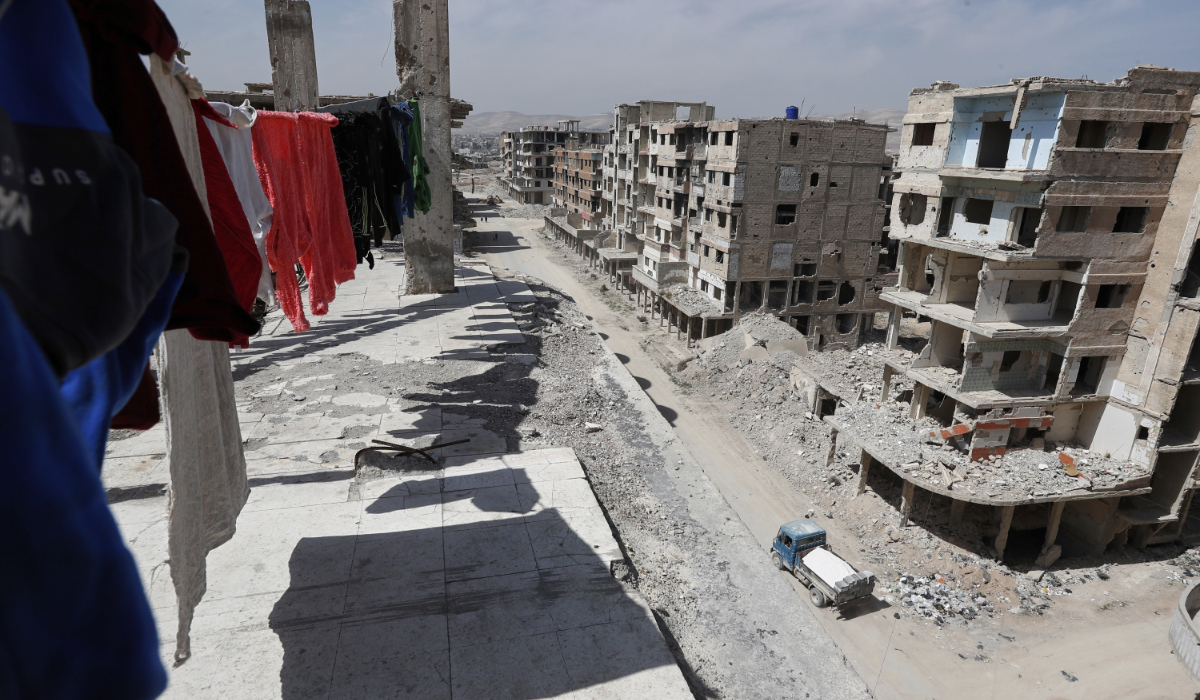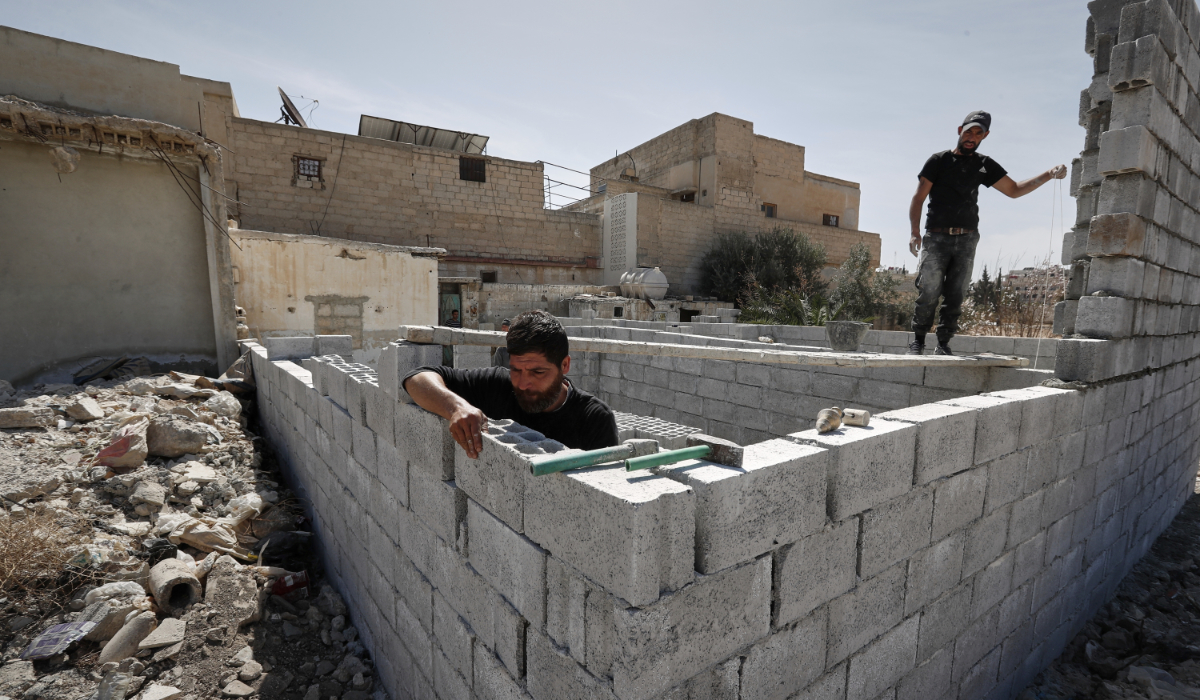DARAYA, Syria: When Mariam Aabour learned of the ouster of Syrian leader Bashar Assad, she shed tears of joy. But as the time came to return to her homeland from Lebanon – where she fled years earlier – Aabour felt torn.
She was happy about the homecoming, but sad to leave behind a son and a stepson who remained in Lebanon to work and pay off family debts. Months before her return, Aabour’s father died in Syria without her seeing him. Her Syrian home has been destroyed and there’s no money to rebuild, she said.
Thus it’s been bittersweet experiencing her first Ramadan – the Muslim holy month – since her return.

Mahmoud al-Hamoud, 35, stands inside his damaged house with his neighbours, as returning Syrians prepare to celebrate Eid al-Fitr, in Idlib, Syria March 28, 2025. (REUTERS)
“We’ve all lost dear ones,” she said. “Even after our return, we still cry over the tragedies that we’ve lived through.”
As they spend their first Ramadan in years in their homeland, many Syrians who’ve recently trickled back in from abroad have been celebrating the end of the Assad family’s rule in December after a fast-paced rebel offensive. They are relishing some new freedoms and savoring some old traces of the lives they once knew.
They enjoy family reunions but many also face challenges as they adjust to a country ravaged by a prolonged civil war and now grappling with a complex transition. As they do, they grieve personal and communal losses: Killed and missing loved ones, their absence amplified during Ramadan. Destroyed or damaged homes. And family gatherings shattered by the exodus of millions.
A time for daily fasting and heightened worship, Ramadan also often sees joyous get-togethers with relatives over food and juices.

Laundry hangs on a damaged apartment building in Daraya, Syria, Monday March 17, 2025. (AP)
Aabour – one of the more than 370,000 Syrians the United Nations’ refugee agency, UNHCR, says have returned to the country since Assad’s ouster – delights in hearing the call to prayer from mosques signaling the end of the daily fast. In her Lebanon neighborhood, she said, there were no nearby mosques and she relied on phones to know when to break the fast.
The hardest part, she added, is sitting for the fast-breaking meal known as “iftar” without some loved ones, including her father and a son, who she said was killed before the family fled Syria.
She bitterly recalled how her child, who she said was about 10 when killed, liked a rice and peas dish for iftar and would energetically help her, carrying dishes from the kitchen.

Workers rebuild a damaged house in Daraya, Syria, Monday, March 17, 2025. (AP)
“I used to tell him, ‘You’re too young,’ but he would say, ‘No, I want to help you,’” she said, sitting on the floor in her in-laws’ house which her family now shares with relatives.
Faraj Al-Mashash, her husband, said he’s not currently working, accumulating more debt and caring for an ill father.
The family borrowed money to fix his father’s home in Daraya. It was damaged and looted, but still standing.
Many Daraya homes aren’t.
Part of Rural Damascus and known for its grapes and its furniture workshops, Daraya was one of the centers of the uprising against Assad. The conflict devolved into armed insurgency and civil war after Assad crushed what started as largely peaceful protests; this Ramadan, Syrians marked the 14th anniversary of the civil war’s start.
Daraya suffered killings and saw massive damage during fighting. It endured years of government besiegement and aerial campaigns before a deal was struck between the government and rebels in 2016 that resulted in the evacuation of fighters and civilians and control ceded to the government.
Today, in parts of Daraya, children and others walk past walls with gaping holes in crumbling buildings. In some areas, a clothesline or bright-colored water tank provides glimpses of lives unfolding among ruins or charred walls.
Despite it all, Al-Mashash said, it’s home.
“Isn’t Daraya destroyed? But I feel like I am in heaven.”
Still, “there’s sadness,” he added. “A place is only beautiful with its people in it. Buildings can be rebuilt, but when a person is gone, they don’t come back.”
In Lebanon, Al-Mashash struggled financially and was homesick for Daraya, for the familiar faces that used to greet him on its streets. Shortly after Assad’s ouster, he returned.
This Ramadan, he’s re-lived some traditions, inviting people for iftar and getting invited, and praying at a mosque where he has cherished memories.
Some of those who had left Daraya, and now returned to Syria, say their homes have been obliterated or are in no condition for them to stay there. Some of them are living elsewhere in an apartment complex that had previously housed Assad-era military officers and is now sheltering some families, mostly ones who’ve returned from internal displacement.
The majority of those who’ve returned to Syria since Assad’s removal came from countries in the region, including Lebanon, Jordan and Turkiye, said Celine Schmitt, UNHCR’s spokesperson in Syria.
A main security fear for returnees is unexploded mines, Schmitt said, adding UNHCR provides “mine awareness sessions” in its community centers. It also offers legal awareness for those needing IDs, birth certificates or property documents and has provided free transportation for some who came from Jordan and Turkiye, she said.
The needs of returnees, so far a fraction of those who’ve left, are varied and big – from work and basic services to house repairs or construction. Many, Schmitt said, hope for financial help to start a small business or rebuild, adding that more funding is needed.
“We’re calling on all of our donors,” she said. “There’s an opportunity now to solve one of the biggest displacement crises in the world, because people want to go back.”
Many of those who haven’t returned cite economic challenges and “the huge challenges they see in Syria” as some of the reasons, she said.
In January, UN High Commissioner for Refugees Filippo Grandi said living conditions in the country must improve for the return of Syrians to be sustainable.
Umaya Moussa, also from Daraya, said she fled Syria to Lebanon in 2013, returning recently as a mother of four, two of whom had never seen Syria before.
Moussa, 38, recalls, at one point, fleeing an area while pregnant and terrified, carrying her daughter and clutching her husband’s hand. The horrors have haunted her.
“I’d remember so many events that would leave me unable to sleep,” she said. “Whenever I closed my eyes, I would scream and cry and have nightmares.”
In Lebanon, she lived for a while in a camp, where she shared the kitchen and bathroom with others. “We were humiliated ..., but it was still better than the fear we’ve lived through.”
She’d yearned for the usual Ramadan family gatherings.
For the first iftar this year, she broke her fast with her family, including brothers who, she said, as fighters against the Assad government, had previously moved to then rebel-controlled Idlib province.
Missing from the Ramadan meal was her father who died while Moussa was away.
Like Moussa, Saeed Kamel is intimately familiar with the pain of a joy incomplete. This Ramadan, he visited the grave of his mother who had died when he was in Lebanon.
“I told her that we’ve returned but we didn’t find her,” he said, wiping away tears.
And it wasn’t just her. Kamel had been hopeful that with Assad gone, they would find a missing brother in his prisons; they didn’t.
Kamel had vowed never to return to a Syria ruled by Assad, saying he felt like a stranger in his country. His home, he said, was damaged and looted.
But despite any difficulties, he held out hope. At least, he said, “the next generation will live with dignity, God willing.”
Kamel fondly recalled how – before their worlds changed – his family would exchange visits with others for most of Ramadan and neighbors would send each other iftar dishes.
“Ramadan is not nice without the family gatherings,” he said. “Now, one can barely manage.”
He can’t feel the same Ramadan spirit as before.
“The good thing,” he said, “is that Ramadan came while we’re liberated.”































